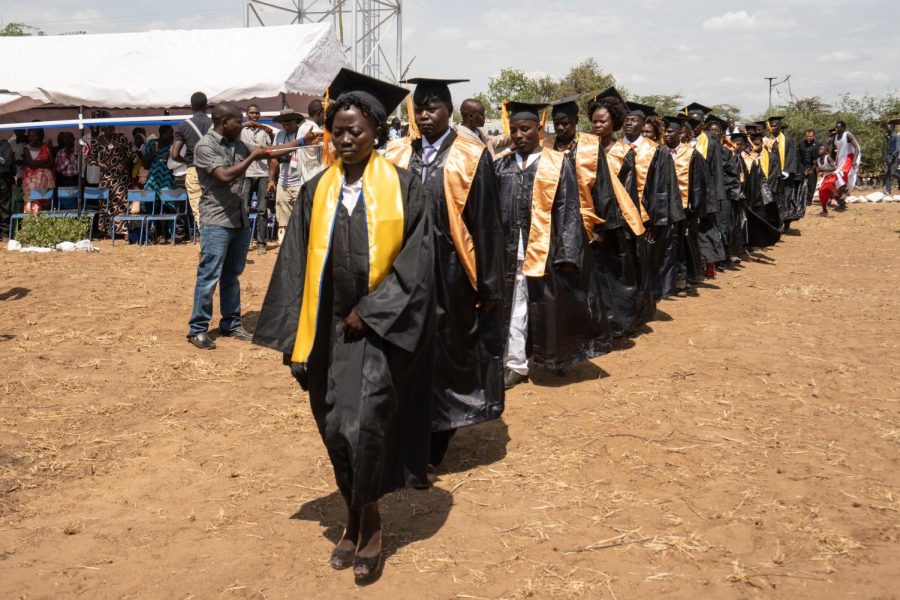SLU partners with Jesuit Worldwide Learning in Kenya and Malawi
Refugee students at a graduation ceremony in Kakuma, Kenya. (Photo courtesy of Jesuit Worldwide Learning)
Saint Louis University is offering refugees at two African camps the opportunity to earn a bachelor’s degree at no cost through a new partnership with Jesuit Worldwide Learning (JWL).
The initiative, which begins in October 2023, allows refugees to obtain a Bachelor of Arts in General Studies through SLU’s School for Professional Studies (SPS), designed for adult learners. The program will initially be open for up to 25 students at two refugee camps, Kakuma in Kenya and Dzaleka in Malawi. It may take on another 25 students in the spring, including prospective students from other camps.
“We’re really excited to be involved with this program, because it is so mission-focused,” SPS director of general studies Kyle Crews, PhD, said. “It really allows us to use our own skills and training as educators for the benefit of others.”
Students will first take a year of online study, or 30 academic hours, through Creighton University in Omaha or the Xavier Institute of Management University (XIMU) in Bhubaneswar, India. SLU will then provide the next three years of study, or 90 hours, through asynchronous virtual learning using software such as Canvas. Students will take two eight-week classes at a time from the refugee camps and will meet together at least once a week for shared support time.
“We recognize the benefits of online education, but we also recognize the benefit of learning and working in a community. This program has a bit of the best of both of those worlds,” associate provost Steve Sanchez, PhD, said.
SLU’s partnership with the JWL was arranged over the last year, initially at the proposal of Martha Habash, JWL USA’s academic director and a professor of classics at Creighton University. Provost Mike Lewis was supportive of the idea and identified the SPS as a good fit over its longtime use of virtual learning and its familiarity with flexibility. Habash first requested that SLU chip in a 30-hour program, like Creighton’s or XIMU’s, but SLU offered to take on 90 hours instead.
The students will be taught in independent cohorts. Professors may come from SLU, the JWL, or the Jesuit-affiliated Ignatian Volunteer Corps, consisting primarily of retired professors. A JWL employee will be on-site at both refugee camps to provide tech support and academic coaching. SLU is also undergoing a candidate search for two new positions, Crews said, ideally to be filled by October 2023: an academic director and a support coordinator for the program.
Refugees face unique barriers to education, Sanchez said, such as reduced internet access and increased personal responsibilities, and differences in time zones make instant communication with professors difficult.
“It is a population and a program that is harder to arrange for many reasons, and harder to reach and harder to serve because of the challenges that these students, by no fault of their own, have to face,” Sanchez said.
Founded in Geneva, Switzerland in 2010, JWL provides support for refugees with the goal of “higher education at the margins.” JWL operates 60 community centers in 20 countries, and has been recognized by the UN’s High Commissioner for Refugees and Jesuit Superior General Arturo Sosa.
“[The program] is really transforming lives and transforming communities because, in good pedagogical fashion, we teach the students that they shouldn’t just be living for themselves but really helping their communities as well,” Habash said.
Your donation will support the student journalists of Saint Louis University.




